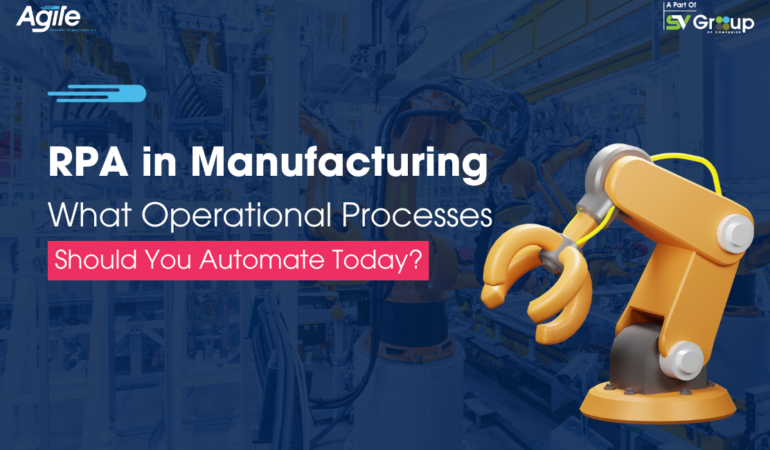Which Operational Processes to Automate in Manufacturing?

Before we delve into which manufacturing processes to automate, let’s understand the world’s origins. ‘Manufacturing’ comes from the Latin word ‘manūfactūra’, which translates to ‘making by a hand.’ Just as Latin has gone extinct and is used sparingly, hand manufacturing is nearly obsolete. Most of the manufacturing processes across different industries have been overtaken by large machines. They do the heavy lifting while humans only manage them.
It is pertinent to understand that manufacturing is only about the factory-level tasks. The machines or raw materials used to manufacture a product must be procured. The humans managing the machines need to be hired. In short, numerous non-production tasks are going on and are just as important as the manufacturing process. For instance, an inventory shortage renders the robots obsolete as they don’t have the materials to make the product.
To ensure the non-production tasks are error-free, streamlined, and add value to the business, it is necessary to automate them. Robotic process automation in manufacturing is not new. With RPA as a Service, RPA costs are considerably low now. Hence, there is no reason not to consider RPA for your manufacturing business. It will help you streamline your operations and allow workers to work on strategic tasks.
However, organisations cannot automate every process as it is impractical and expensive. Therefore, it is essential to identify the processes that would generate the most value if automated. This article discusses the top operational processes that should be automated in manufacturing. As a leading RPA company in Dubai, Agile Managex Technologies can help you automate these or any other process.
Processes to Automate in Manufacturing
- Supply Chain Management
If you know anything about this area, you’ll know that it consists of small, repetitive processes. However, an error in one task can impact the entire process. Therefore, automating is a perfect decision. Data-driven RPA can also enhance your supply chain’s visibility. Businesses are up to date about shipping times, and status updates are shared automatically with the required stakeholders. Usually, employees do the entire process manually, increasing the possibility of error.
- Bill of Materials
How does the supply chain team know which items to order and what quantity? This information is contained in the bill of materials. Due to its nature, it is considered the most critical document in any supply chain process. A single error can result in all the procured items being rendered worthless. RPA can be implemented to automate the data collection process and verify the collected data from different sources. It ensures the bill of materials is accurate.
- Talent Recruitment
The human resource is a source of competitive advantage. However, this advantage is only realised if the workers are aligned with the organisation’s objectives. Secondly, the organisation has a steady flow of talented workers. RPA can prove highly beneficial in the talent recruitment process. RPA can be deployed to mass post on job sites, scrape data from LinkedIn, and verify candidate data from relevant sources.
- Timely Payments
Making timely payments to vendors is an excellent way to establish rapport. A good working relationship with vendors can prove highly beneficial for an organisation. It can get favourable rates and priority delivery. These two are enough to attain a competitive advantage in the current business landscape. RPA can be implemented to verify the invoice against the bill of materials or order sheet and process it for payment. The RPA can process the payment automatically or inform the relevant department.
- Inventory Management
An organisation must know how much stock it requires and when. Otherwise, over and understocking can prove highly detrimental to the company’s operations. RPA can be implemented to analyse the demand. The bot will analyze historical data to determine what product and quantity are required. It can then generate alerts based on the analysis and make a purchase order for the items.
Conclusion
It concludes our article on the top operational processes to automate in manufacturing. Contact us if you require help automating these processes or identifying other ones that can be automated for more streamlined operations.

Leave A Comment